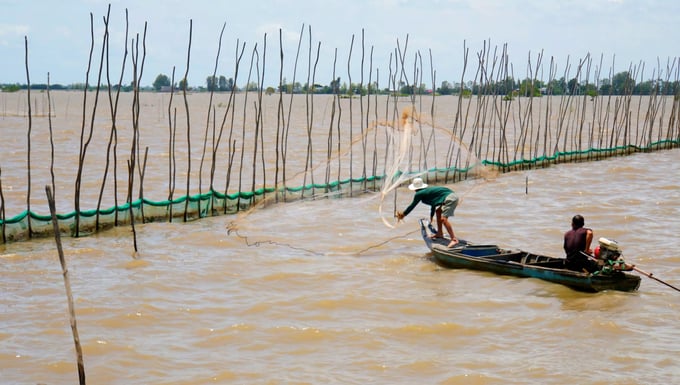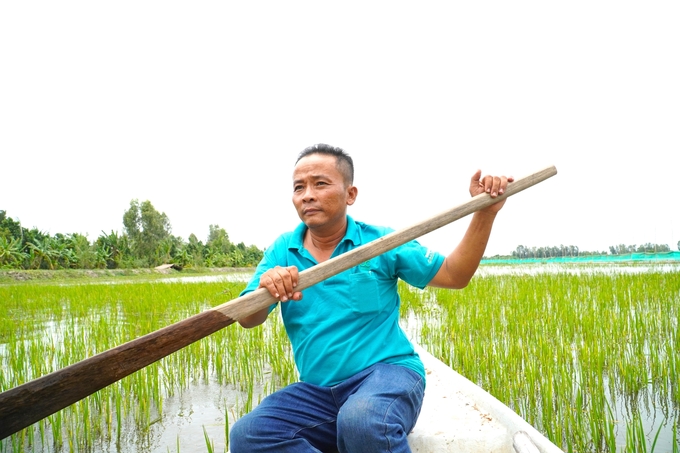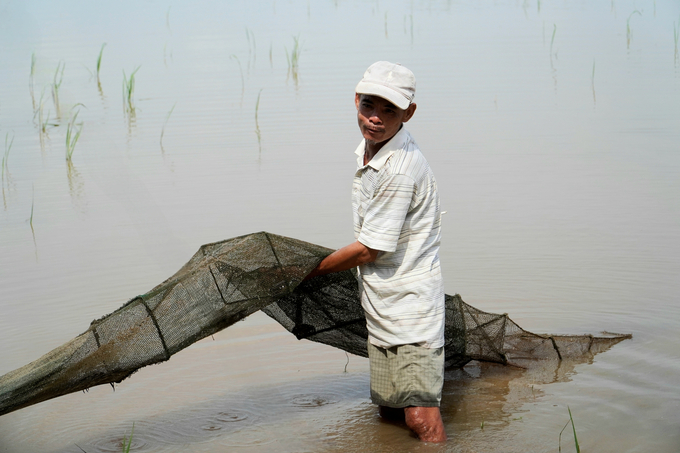May 30, 2025 | 09:41 GMT +7
May 30, 2025 | 09:41 GMT +7
Hotline: 0913.378.918
May 30, 2025 | 09:41 GMT +7
Hotline: 0913.378.918
Instead of intensively farming three rice crops a year, a group of farmers outside the embankment area in Long An A Hamlet, Phu Thanh A Commune (Tam Nong District, Dong Thap Province) chose to develop a rice-fish-duck ecological model.
Specifically, when water from the upper Mekong River flows in, the locals set up nets to trap wild fish in their rice fields. The water gates are specially designed so that fish can enter but cannot escape. Around the 9th to 10th month of the lunar calendar, they begin harvesting the fish.

Restoring the natural ecosystem is one of the solutions that helps make rice production more sustainable. Photo: Kim Anh.
During the dry season, after sowing the winter-spring rice crop, farmers continue to raise ducks in the rice fields. Additionally, a small number of remaining wild fish are stored, forming a circular production model.
The most obvious benefit is that rice cultivation through cluster or row sowing allows better air circulation, helping the rice plants grow stronger. The ducks, released into the fields, eat weeds, insects and pests, reducing harmful organisms and minimizing the need for 1-2 pesticide applications.
Nguyen Thien Thuat, Deputy Director of Quyet Tien Ecological Agricultural Cooperative in Long An A Hamlet, Phu Thanh A Commune, has been one of the pioneering farmers participating in this model since 2021.
At that time, during the flood season, farmers typically worked independently, either leaving their fields fallow or fishing for wild fish. Gradually recognizing the depletion of resources, Thuat, along with a few like-minded farmers, boldly pooled their resources and collaborated to test the model on a scale of over 10 rods of land.
Though it started out as a less serious experiment, the model has proven to be quite economically viable. Notably, during a chance visit, Minister of Agriculture and Rural Development Le Minh Hoan encouraged the farmers and established a group of seven members to further develop the model.
By 2023, the model had evolved into a community-managed cooperative group, expanding to 200 rods of land, generating an average profit of over 4.100 USD during the flood season. On average, by making use of rice, fish, and ducks, farmers could achieve an annual profit of about 2.900 USD/ha.
Recognizing its economic potential, in July 2024, local authorities encouraged farmers to establish the Quyet Tien Ecological Agricultural Cooperative, with 24 members. The cooperative is now preparing to scale the model up to a total of 170 ha.

The rice-fish-duck model is thriving and bringing high economic efficiency at the Quyet Tien Ecological Agricultural Cooperative in Long An A Hamlet, Phu Thanh A Commune, Tam Nong District, Dong Thap Province. Photo: Kim Anh.
In 2025, the People's Committee of Tam Nong District plans to expand and develop the model to a scale of 400 ha to facilitate the management of resources from the natural ecosystem.
Mr. Thuat shared that after more than 20 years of growing rice, conditions used to be very favorable, so he became complacent, never considering how much the climate would change.
Initially, when developing the rice-fish-duck model, he only hoped to earn additional income instead of relying entirely on rice farming. After many opportunities provided by local authorities to participate in training programs and exchange experiences with other areas within and outside the province, Mr. Thuat came to understand the importance of restoring the natural ecosystem, as it is the right direction. He then encouraged other farmers to adopt the model.
Calculating the economic efficiency, Thuat stated that for his family’s 2 ha, during the flood season, they could earn 420 to 460 USD/ha. If the community actively participates and expands the model to a larger scale, reducing investment costs, the profits could be even higher.
"The rice cultivation process still allows for fish in the fields. Therefore, I assure that farmers will automatically reduce pesticide use, limiting the density of pests. For about three years now, in the fish storage areas of the cooperative, we have encountered rare fish like giant barb and river catfish - species we haven't seen for over a decade, which have now reappeared. This is because farmers have minimized pesticide use, creating an environment for fish to gather and reproduce", Mr. Thuat expressed enthusiastically about the model's effectiveness.
An Binh B Ward (Hong Ngu City, Dong Thap Province) is also an area outside the embankment. Previously, Mr. Lam Quoc Tuan from Hamlet 2 (An Binh B Ward) collaborated with three other farmers in the region to develop a model of two rice crops and one fish crop, in which they stored wild fish during the flood season.

While also implementing the wild fish storage model, some farmers in An Binh B Ward, Hong Ngu City, are hesitant due to a lack of support from local authorities. Photo: Kim Anh.
According to Mr. Tuan, Hong Ngu City is an area that experiences floods early, with abundant wild fish, making the wild fish storage model very effective. With 40 rods of land, last year Mr. Tuan earned a profit of over 10 million VND (approximately $420 USD). This is considered a pioneering model in Dong Thap Province.
The farmers are determined to maintain the model, as Mr. Tuan said: "Just keep trying. If we fail this time, we'll learn from the experience and the model will succeed next time". However, after these efforts, there is growing frustration among the farmers due to a lack of local government support in managing illegal fishing activities. As a result, only two households are currently participating and they plan to transition to a model of two rice crops and one cash crop in the near future.
"The local government doesn't invest much and if they remain indifferent, the farmers will stop participating. This area has a lot of fish coming in from upstream, but the local authorities need to provide support by preventing illegal fishing; they have to catch offenders. If they remain negligent, nothing can be done. The authorities must work closely with farmers to tighten management on this issue, so that the wild fish storage model is sustained and expanded", Mr. Tuan expressed.

Storing wild fish during the flood season requires low investment costs but offers high economic returns. Photo: Kim Anh.
Living in Hamlet 2 (An Binh B Ward), Mr. Nguyen Duc Trung is seeking a breakthrough to increase income per unit of area. He considers a rice-cash crop model to be suitable.
Sesame is currently a preferred choice among farmers. However, the challenge lies in the unstable market and lack of official outlets. For example, in the most recent harvest, Mr. Trung sold sesame at 1.92 to 2 USD/kg, while the market price was around 2.16 USD/kg. Furthermore, at harvest time, finding local labor is very difficult and hiring costs are quite high.
Currently, farmers are researching and collaborating with Southern Seed Corporation (SSC) to find new short-season crops that are suitable for this area.
In the first six months of 2024, the rice cultivation area in Dong Thap Province decreased compared to the plan. Specifically, the province planted nearly 189.000 ha, a reduction of about 1.300 ha. This decrease is due to the shift in crop structure towards perennial plants or crops showing strong market potential, such as durian and jackfruit.
Translated by Phuong Linh

(VAN) Ms. Nguyen Thi Dung, Deputy Director of Ngoc Hoang Cooperative, shared about the journey of bringing dragon fruit to Europe, achieving annual revenues in the billions of VND.

(VAN) Bamboo products from Thang Tho Bamboo Cooperative have reached many countries around the world, while also creating jobs for local workers.

(VAN) The Management Board of Con Dao National Park reported that a green sea turtle, tagged in the Philippines, has traveled thousands of kilometers to lay 84 eggs on Bay Canh Islet.

(VAN) Green technology is paving a new path for sustainable aquaculture in the Mekong Delta in particular and across the country in general, helping reduce emissions and adapt to climate change.

(VAN) On May 27, La French Tech Vietnam (the French startup and innovation community in Vietnam) held the French Tech Summit Vietnam 2025.
/2025/05/27/4731-2-223159_980.jpg)
(VAN) No votive paper, no styrofoam, no plastic bags, no plastic bottles, and no single-use plastic trays are the key rules tourists should keep in mind when visiting Con Dao.

(VAN) In the fight against plastic pollution, Vietnam has been demonstrating a proactive, pioneering, and active role in addressing the greatest environmental challenge today.